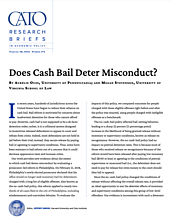In recent years, hundreds of jurisdictions across the United States have begun to reduce their reliance on cash bail. Bail reform is motivated by concerns about inadvertent detention for those who cannot afford to pay. However, cash bail is not supposed to be a de facto detention order; rather, it is a collateral system designed to incentivize released defendants to appear in court and refrain from crime. Indeed, most defendants are not held in jail before their trial; instead, they secure release by paying bail or agreeing to supervisory conditions. Thus, some have been resistant to bail reform out of a concern that it could decrease appearance rates and increase crime.
Our work provides new evidence about the extent to which cash bail deters misconduct by evaluating a prosecutor-led reform in Philadelphia. On February 21, 2018, Philadelphia’s newly elected prosecutor declared that his office would no longer seek monetary bail for defendants charged with a long list of eligible offenses. Also known as the no-cash-bail policy, this reform applied to nearly two-thirds of all cases filed in the city of Philadelphia, including misdemeanors and nonviolent felonies. To evaluate the impacts of this policy, we compared outcomes for people charged with these eligible offenses right before and after the policy was enacted, using people charged with ineligible offenses as a benchmark.
The no-cash-bail policy affected bail-setting behavior, leading to a sharp 22 percent (11 percentage point) increase in the likelihood of being granted release without monetary or supervisory conditions, known as release on recognizance. However, the no-cash-bail policy had no impact on pretrial detention rates. This is because most of those who received release on recognizance because of the reform would have been released after paying low monetary bail ($500 or less) or agreeing to the conditions of pretrial supervision or unsecured bail (i.e., the defendant does not need to pay for release but owes money to the court should they fail to appear).
Since the no-cash-bail policy changed the conditions of release without affecting the overall release rate, it provided an ideal opportunity to test the deterrent effects of monetary and supervisory conditions among this group of low-level offenders. Our evidence is inconsistent with such a deterrent effect: neither failures to appear nor pretrial crime increased when the no-cash-bail policy was enacted. We were able to isolate the impacts of cash bail as distinct from pretrial supervision, and our results show no evidence that financial incentives increase compliance, suggesting that monetary bail is not necessary to prevent misconduct for the large majority of those evaluated.
This poses a puzzle: monetary bail is widely used under the theory that it incentivizes court appearances and deters crime, yet Philadelphia was able to substantially liberalize the conditions of pretrial release with no detectable adverse consequences. Why are pretrial conditions unnecessarily stringent? One possible explanation is that magistrates have an incentive to err on the side of setting restrictive conditions. If a magistrate is too lenient toward someone who reoffends, that magistrate may come under public scrutiny or feel remorse when people for whom they set low cash bail commit new crimes. In contrast, no one knows for certain when a magistrate is too harsh on someone who would not have reoffended under more lenient conditions, since no one can observe what a detained person would have done if released. If magistrates are penalized more for being too lenient rather than too harsh, they will tend to set bail higher than necessary. These dynamics create low-hanging fruit in bail reform: a pool of defendants for whom monetary and supervisory conditions can be eliminated without adverse consequences.
How big is this pool? Would a more comprehensive bail reform lead to greater adverse consequences? The answers depend on how many defendants in Philadelphia are still receiving unnecessarily restrictive bail. If magistrates have exhausted the pool of defendants who can be granted release on recognizance without adverse consequences, then greater liberalization may come with tradeoffs. Our research provides evidence that this is not the case. First, our results hold for both misdemeanors and felonies, suggesting that even some people charged with more-serious offenses do not need these pretrial measures to deter misconduct. Second, we exploited the fact that defendants in Philadelphia are quasi-randomly assigned to magistrates, who vary in their pretrial practices and responsiveness to the no-cash-bail reform. Our results show that magistrates who were originally lenient substantially reduced their use of cash bail after the reform without adverse consequences— even though they were most likely to have exhausted the pool of defendants who could safely be granted release on recognizance before the reform. This suggests that there may be room for the stricter magistrates to decrease their reliance on cash bail even more.
Note:
This research brief is based on Aurélie Ouss and Megan Stevenson, “Does Cash Bail Deter Misconduct?,” American Economic Journal: Applied Economics 15, no. 3 (July 2023): 150–82.

This work is licensed under a Creative Commons Attribution-NonCommercial-ShareAlike 4.0 International License.
